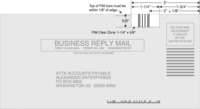Facing Identification Mark
Dan Tobias (Talk | contribs) (There's actually a fifth code, still not mentioned in Wikipedia article!) |
Dan Tobias (Talk | contribs) |
||
| Line 8: | Line 8: | ||
The '''Facing Identification Mark''' is a bar code format used by the United States Postal Service. Unlike the [[Intelligent Mail barcode]] or [[POSTNET]] code, it does not encode the specific recipient or sender of the mail. Rather, it is pre-printed near the upper right corner of a reply envelope (as printed and sent by businesses seeking a reply to an ad, invoice, etc.) to help mail-sorting machinery determine the proper orientation of a mail piece for address-scanning and cancellation, as well as to distinguish between several different types of reply envelope which differ in postage-collection and sorting. | The '''Facing Identification Mark''' is a bar code format used by the United States Postal Service. Unlike the [[Intelligent Mail barcode]] or [[POSTNET]] code, it does not encode the specific recipient or sender of the mail. Rather, it is pre-printed near the upper right corner of a reply envelope (as printed and sent by businesses seeking a reply to an ad, invoice, etc.) to help mail-sorting machinery determine the proper orientation of a mail piece for address-scanning and cancellation, as well as to distinguish between several different types of reply envelope which differ in postage-collection and sorting. | ||
| − | The bar code carries a set of bits (1 or 0) encoded by the presence (1) or absence (0) of a bar at a given position. There are nine bits in all in a code. This would allow 512 (2<sup>9</sup>) possible values, | + | The bar code carries a set of bits (1 or 0) encoded by the presence (1) or absence (0) of a bar at a given position. There are nine bits in all in a code. This would allow 512 (2<sup>9</sup>) possible values, though since the first and last are (so far) always 1 (otherwise it would be hard to tell where the code began and ended), this results in only 7 bits (or 128 possible values) available for use. In practice only five codes are currently used: |
* '''FIM A''': 110010011 - Reply mail requiring stamp or meter (Courtesy Reply Mail), with [[POSTNET]] or [[Intelligent Mail barcode]] | * '''FIM A''': 110010011 - Reply mail requiring stamp or meter (Courtesy Reply Mail), with [[POSTNET]] or [[Intelligent Mail barcode]] | ||
Latest revision as of 21:16, 14 July 2013
The Facing Identification Mark is a bar code format used by the United States Postal Service. Unlike the Intelligent Mail barcode or POSTNET code, it does not encode the specific recipient or sender of the mail. Rather, it is pre-printed near the upper right corner of a reply envelope (as printed and sent by businesses seeking a reply to an ad, invoice, etc.) to help mail-sorting machinery determine the proper orientation of a mail piece for address-scanning and cancellation, as well as to distinguish between several different types of reply envelope which differ in postage-collection and sorting.
The bar code carries a set of bits (1 or 0) encoded by the presence (1) or absence (0) of a bar at a given position. There are nine bits in all in a code. This would allow 512 (29) possible values, though since the first and last are (so far) always 1 (otherwise it would be hard to tell where the code began and ended), this results in only 7 bits (or 128 possible values) available for use. In practice only five codes are currently used:
- FIM A: 110010011 - Reply mail requiring stamp or meter (Courtesy Reply Mail), with POSTNET or Intelligent Mail barcode
- FIM B: 101101101 - Business Reply Mail (postpaid), without POSTNET or Intelligent Mail barcode
- FIM C: 110101011 - Business Reply Mail (postpaid), with POSTNET bar code
- FIM D: 111010111 - Information-Based Indicia postage (uses PDF417 or Data Matrix bar code)
- FIM E: 101000101 - Customized services (uses Intelligent Mail barcode)
[edit] Standards documents
[edit] Other links
- Wikipedia article
- Obtaining Facing Identification Mark (for Courtesy Reply Mail)
- Info on Facing Identification Marks
